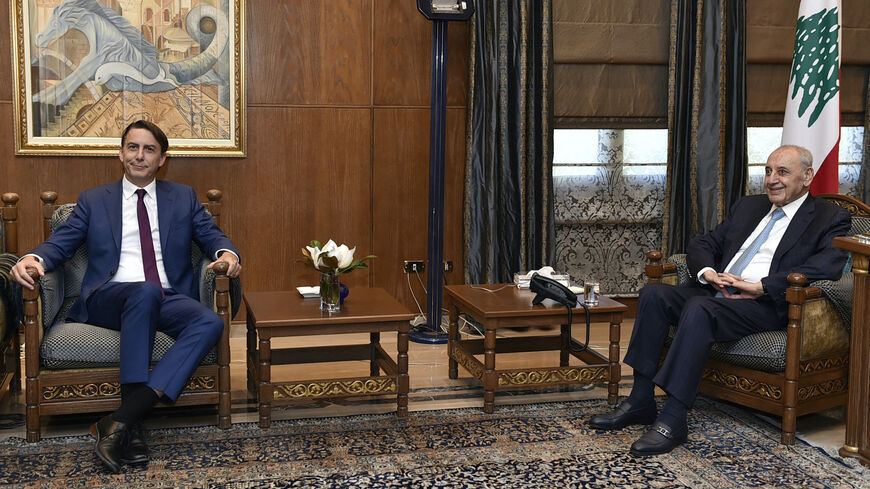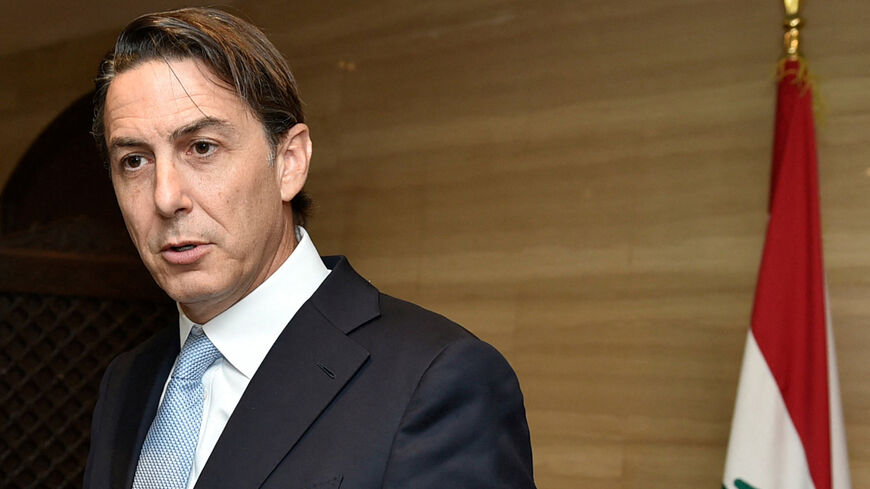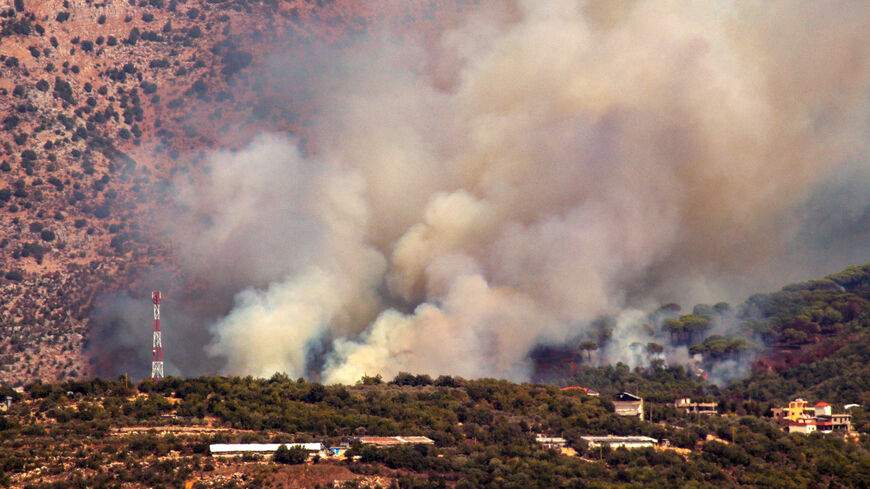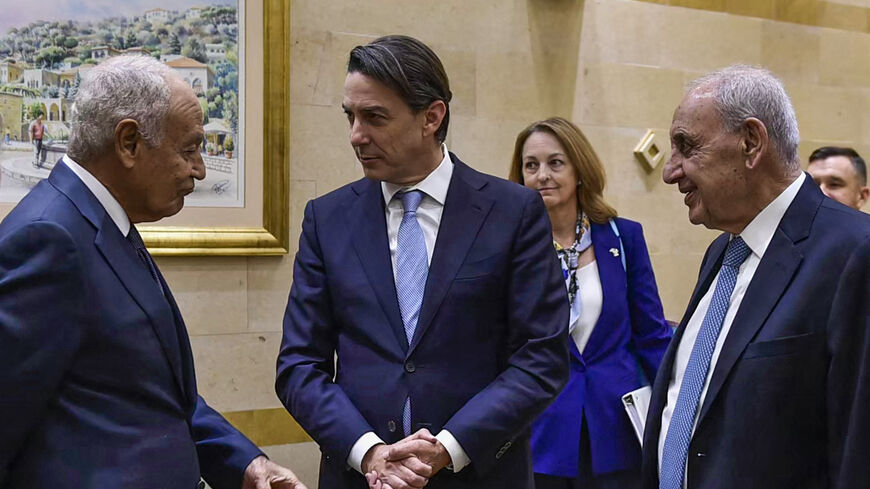Amos Hochstein arrives in Lebanon as Hezbollah-Israel escalation threatens war
Hochstein’s visit comes as the US seeks an end to the fighting along the Lebanese-Israeli border in parallel with a cease-fire in the Gaza Strip.

BEIRUT — US envoy Amos Hochstein arrived in Beirut on Monday for talks on a cease-fire between Israel and Hezbollah as Washington intensifies its efforts to halt the cross-border hostilities, and is increasingly fearing risk of an all-out war.
Hochstein, who currently serves as the White House senior adviser to the president for energy and investment, is scheduled to meet with top Lebanese officials, including caretaker Prime Minister Najib Mikati and Parliament Speaker Nabih Berri, who is also the head of the Shiite Amal movement, an ally of Hezbollah.
Hochstein was also appointed mediator in the US-sponsored talks between Israel and Lebanon in 2021, which resulted in a rare maritime border agreement between the two countries in October 2022.
Hezbollah, which the United States designates as a terror group, is not a direct party to the talks led by Hochstein.
The discussions in Beirut will focus on “areas of mutual and regional concern,” the US Embassy in Lebanon announced shortly after Hochstein's arrival.
The United States is increasingly worried about a full-fledged war between Israel and Hezbollah, on a scale not seen since 2006. CNN reported last week that US officials “are concerned that Israel is planning a ground incursion into Lebanon that could be launched in the late spring or early summer if diplomatic efforts fail to push Hezbollah back from the northern border with Israel.”
Hochstein is then expected to travel to Israel, where he will hold talks with Prime Minister Benjamin Netanyahu, Defense Minister Yoav Gallant, Mossad chief David Barnea and other senior officials, Israeli media reported.
The Iran-backed Hezbollah movement and Israel have been engaged in heavy fighting along the Lebanese-Israeli border since October, in parallel with the war in the Gaza Strip.
The fighting has escalated in recent weeks, with Israel striking deeper inside Lebanese territory, raising fears of a wider conflict that would drag Lebanon into an unwanted war as the small Mediterranean country reels from a devastating economic crisis.
Israel has also increased its targeted assassinations of senior Hezbollah commanders in recent weeks. Seven Hezbollah fighters were killed in separate Israeli air and drone strikes in southern Lebanon over the weekend.
On Monday, at least one person was killed and seven others injured when an anti-tank missile fired from Lebanon struck near the community of Margaliot in Israel, according to local medics.
Earlier on Sunday, Hezbollah foiled two separate Israeli infiltration attempts into southern Lebanon. In a statement, the group said it struck two Israeli forces with explosives, artillery shells and missiles as they attempted to infiltrate into Lebanese territory from Kherbet Zar'it facing the southern border town of Ramia, and from Wadi Qatmoun opposite the village of Rmeish.
According to a tally by the local L’Orient Today news outlet, at least 229 Hezbollah members have been killed since October. At least 44 civilians have been killed in Lebanon, according to AFP, and at least nine soldiers and nine civilians in Israel, as per the Israeli army.
Washington pushing for calm
The US diplomatic efforts to appease the border situation coincide with reports of an imminent cease-fire in Gaza. Hamas officials are currently in Cairo to discuss a proposal that includes a six-week pause in the fighting during which the remaining hostages it is holding captive would be released in exchange for a number of Palestinian prisoners held in Israeli jails.
Lebanese deputy parliament Speaker Elias Bou Saab, who is also set to meet with Hochstein in Beirut, told Reuters on Sunday the US official’s visit points to progress in the Gaza truce talks.
He believes if a cease-fire is announced, “Hochstein's visit this time will be of great importance to follow up on the truce on our southern borders and to discuss what is needed for stability and ending the possibility of the expansion of the war with Lebanon."
Hezbollah has repeatedly said that any halt in the attacks in southern Lebanon are contingent with a cease-fire in Gaza.
However, Israel has vowed to continue fighting Hezbollah even if a truce is reached in the Gaza Strip.
“In the event of a temporary truce in Gaza, we will increase the fire in the north and will continue until the full withdrawal of Hezbollah [from the border],” Gallant said last week.
During a previous visit to Beirut in January, Hochstein said a diplomatic solution was needed to restore calm in the border areas of both Israel and Lebanon.
Israel has demanded that Hezbollah pull back its forces 10 kilometers (6 miles) from its border as a condition to stop its attacks in Lebanon in accordance with UN Security Council Resolution 1701, which ended the war that Israel and Hezbollah fought in 2006.
However, Hezbollah has rejected these demands.
Bou Saab, in his statements to Reuters, said Hochstein had “serious ideas that may provide the beginning of a sustainable solution, stability and banishing the specter of war that will not be in anyone’s interest.”








